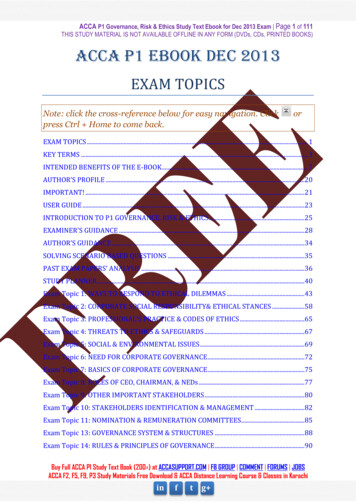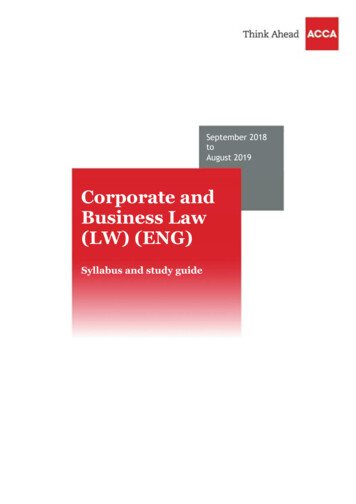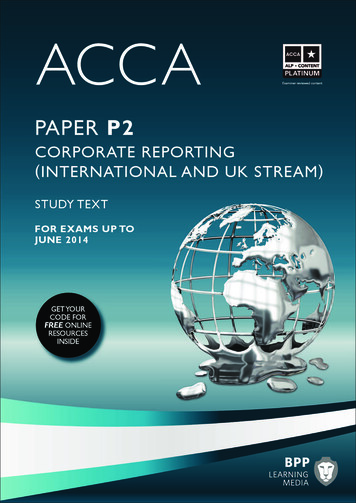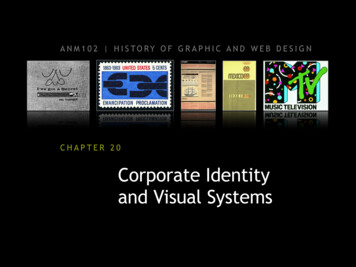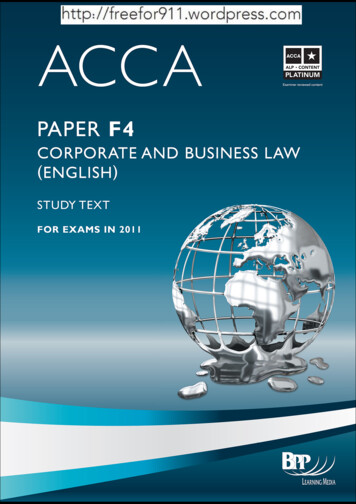
Transcription
STUDYPAPER F4CORPORATE AND BUSINESS LAW(ENGLISH)BPP Learning Media is the sole ACCA Platinum Approved Learning Partner – contentfor the ACCA qualification. In this, the only Paper F4 (ENG) study text to be reviewedby the examiner: We discuss the best strategies for studying for ACCA exams We highlight the most important elements in the syllabus and the key skills you will need We signpost how each chapter links to the syllabus and the study guide We provide lots of exam focus points demonstrating what the examiner will want you to do We emphasise key points in regular fast forward summaries We test your knowledge of what you've studied in quick quizzes We examine your understanding in our exam question bank We reference all the important topics in our full indexBPP's i-Pass product also supports this paper.FOR EXAMS IN 2011TEXT
First edition 2007Fourth edition December 2010ISBN 9780 7517 8918 8(Previous ISBN 9870 7517 6364 5)British Library Cataloguing-in-Publication DataA catalogue record for this bookis available from the British LibraryPublished byBPP Learning Media LtdBPP House, Aldine PlaceLondon W12 8AAAll our rights reserved. No part of this publication may bereproduced, stored in a retrieval system or transmitted, inany form or by any means, electronic, mechanical,photocopying, recording or otherwise, without the priorwritten permission of BPP Learning Media Ltd.www.bpp.com/learningmediaPrinted in the United KingdomWe are grateful to the Association of Chartered CertifiedAccountants for permission to reproduce pastexamination questions. The suggested solutions in theexam answer bank have been prepared by BPP LearningMedia Ltd, unless otherwise stated.Your learning materials, published by BPPLearning Media Ltd, are printed on papersourced from sustainable, managed forests. BPP Learning Media Ltd2010ii
ContentsPageIntroductionHelping you to pass – the ONLY F4 (ENG) Study Text reviewed by the examiner!Studying F4The exam paperPart A Essential elements of the legal system123The English legal systemSources of English lawHuman rightsPart B The law of obligations456789Formation of contracts IFormation of contracts IITerms of contractBreach of contractThe law of tortsProfessional negligencePart C Employment law1011Employment contractDismissal and redundancyPart D The formation and constitution of business organisations12131415Agency lawOrganisations and legal personalityCompany formationConstitution of a companyPart E Capital and the financing of companies161718Share capitalBorrowing and loan capitalCapital maintenance and dividend lawPart F Management, administration and regulation of companies1920Company directors and other company officersCompany meetings and resolutionsPart G Legal implications of companies in difficulty or in crisis21Insolvency and administrationPart H Governance and ethical issues relating to business2223Corporate governanceFraudulent 37255269283299333351371387Exam question bank403Exam answer bank409List of cases and index441Review form and free prize drawContentsiii
A note about copyrightDear CustomerWhat does the little mean and why does it matter?Your market-leading BPP books, course materials and elearning materials do not write and updatethemselves. People write them: on their own behalf or as employees of an organisation that invests in thisactivity. Copyright law protects their livelihoods. It does so by creating rights over the use of the content.Breach of copyright is a form of theft – as well being a criminal offence in some jurisdictions, it ispotentially a serious breach of professional ethics.With current technology, things might seem a bit hazy but, basically, without the express permission ofBPP Learning Media: Photocopying our materials is a breach of copyright Scanning, ripcasting or conversion of our digital materials into different file formats, uploading themto facebook or emailing them to your friends is a breach of copyrightYou can, of course, sell your books, in the form in which you have bought them – once you have finishedwith them. (Is this fair to your fellow students? We update for a reason.) But the e-products are sold on asingle user licence basis: we do not supply ‘unlock’ codes to people who have bought them second hand.And what about outside the UK? BPP Learning Media strives to make our materials available at pricesstudents can afford by local printing arrangements, pricing policies and partnerships which are clearlylisted on our website. A tiny minority ignore this and indulge in criminal activity by illegally photocopyingour material or supporting organisations that do. If they act illegally and unethically in one area, can youreally trust them?iv
Helping you to pass – the ONLY F4 (ENG) Study Textreviewed by the examiner!BPP Learning Media – the sole PlatinumApproved Learning Partner - contentAs ACCA’s sole Platinum Approved Learning Partner – content, BPP Learning Media gives you theunique opportunity to use examiner-reviewed study materials for the 2011 exams. By incorporating theexaminer’s comments and suggestions regarding the depth and breadth of syllabus coverage, the BPPLearning Media Study Text provides excellent, ACCA-approved support for your studies.The PER alertBefore you can qualify as an ACCA member, you do not only have to pass all your exams but also fulfil athree year practical experience requirement (PER). To help you to recognise areas of the syllabus thatyou might be able to apply in the workplace to achieve different performance objectives, we haveintroduced the ‘PER alert’ feature. You will find this feature throughout the Study Text to remind you thatwhat you are learning to pass your ACCA exams is equally useful to the fulfilment of the PERrequirement.Tackling studyingStudying can be a daunting prospect, particularly when you have lots of other commitments. Thedifferent features of the text, the purposes of which are explained fully on the Chapter features page, willhelp you whilst studying and improve your chances of exam success.Developing exam awarenessOur Texts are completely focused on helping you pass your exam.Our advice on Studying F4 outlines the content of the paper, the necessary skills the examiner expectsyou to demonstrate and any brought forward knowledge you are expected to have.Exam focus points are included within the chapters to highlight when and how specific topics wereexamined, or how they might be examined in the future.Using the Syllabus and Study GuideYou can find the syllabus and Study Guide on page (xi) of this Study TextTesting what you can doTesting yourself helps you develop the skills you need to pass the exam and also confirms that you canrecall what you have learnt.We include Questions – lots of them - both within chapters and in the Exam Question Bank, as well asQuick Quizzes at the end of each chapter to test your knowledge of the chapter content.Introductionv
Chapter featuresEach chapter contains a number of helpful features to guide you through each topic.Topic listTopic listSyllabus referenceWhat you will be studying in this chapter and the relevantsection numbers, together the ACCA syllabus references.IntroductionPuts the chapter content in the context of the syllabus asa whole.Study GuideLinks the chapter content with ACCA guidance.Exam GuideHighlights how examinable the chapter content is likely tobe and the ways in which it could be examined.Knowledge brought forward from earlier studiesWhat you are assumed to know from previousstudies/exams.FAST FORWARDSummarises the content of main chapter headings,allowing you to preview and review each section easily.ExamplesDemonstrate how to apply key knowledge andtechniques.Key termsDefinitions of important concepts that can often earn youeasy marks in exams.Exam focus pointsWhen and how specific topics were examined, or howthey may be examined in the future.Formula to learnFormulae that are not given in the exam but which have tobe learnt.Gives you a useful indication of syllabus areas thatclosely relate to performance objectives in your PracticalExperience Requirement (PER).viIntroductionQuestionGives you essential practice of techniques covered in thechapter.Case StudyReal world examples of theories and techniques.Chapter RoundupA full list of the Fast Forwards included in the chapter,providing an easy source of review.Quick QuizA quick test of your knowledge of the main topics in thechapter.Exam Question BankFound at the back of the Study Text with morecomprehensive chapter questions. Cross referenced foreasy navigation.
Studying F4This paper examines a basic understanding of legal principles and their application. You may find thematerial a little different from what you are used to because there are virtually no numbers involved.Therefore it is important to develop a concise style of writing in order to get your points across quicklyand clearly.The F4 examinerThe examiner for this paper is David Kelly and he has been in the role for some time. Therefore thereshould be no surprises when it comes to your exam – each of his papers is similar in style and content.1 What F4 is aboutThe main aims of the F4 exam are: To develop knowledge and skills in the understanding of the general legal framework and ofspecific legal areas relating to business, but To recognise the need to seek further specialist legal advice where necessaryThe exam is not designed to turn you into a legal expert. Instead you will be a well-informed professionalaccountant who appreciates the legal issues of doing business but who recognises the boundaries of theirlegal knowledge and therefore the point at which professional legal expertise must be sought. Thesequence of the syllabus and study guide takes you through the main areas of what you need to know.Essential elements of the legal systemIn this part of the syllabus you are covering areas that underlie all the other areas, namely: what is law andhow the UK legal system creates and administers it. The distinctions between criminal law and civil law,between common law and civil law and between public law and private law, are very important. Most ofthe paper is concerned with civil law, namely the law that sets out the rights and duties of persons inrelation to each other. There are elements of criminal law in relation to companies, insolvency, insiderdealing and money laundering, in addition to the topical area of human rights legislation.Law of obligationsThe syllabus clearly distinguishes two important types of obligation that individuals and businesses have.ContractWhen individuals or businesses make agreements, a legally binding contract may be formed. This paperfocuses on the requirements that must be met for a contract to be binding on the parties, what validcontracts must contain, under which circumstances the contractual terms are breached and whatremedies are available for the affected party.TortAll members of society have a duty not to harm others and this principle forms the basis of tort. The tortof negligence is highly topical and has an impact on individuals, businesses and professionals (such asaccountants). It is important for you to understand how such a duty is formed, the circumstances that willcause a breach of that duty and if there are any defences to a breach that the perpetrator can call on.Employment lawEmployees and employers are bound to each other by an employment contact. It is important that youhave a good understanding of the contents of such a contract. Both employers and their employees oweduties to each other and breach of these duties can result in legal action being taken.Termination of employment can be fraught with danger for employers if it is not handled correctly. Theterms of 'wrongful' and 'unfair' dismissal are used commonly in the media, but the causes and remediesare distinct and it is important for you to understand the difference.Introductionvii
Formation and constitution of business organisationsThe syllabus is very concerned with the various legal forms through which business transactions may beconducted. It is important to distinguish initially between natural persons (human beings) and legalpersons (including natural persons, but extending to some forms of partnership and, most significantly,companies). The law of agency underlies a substantial part of our study of business forms, since partnersand directors can and sometimes do act as agents.Capital and the financing of companiesMost trading companies are financed by a mix of share capital (provided by their owners) and loan capital(provided by third party lenders). Share capital may take a variety of forms, with each class of sharehaving different rights within the company. However, the primary responsibility of the shareholder is tocontribute funds to the company in accordance with the terms of the company’s constitution and theshares which they own. The return of these funds to shareholders is restricted since they are seen as the'creditors' buffer', that is the funds which are available to settle creditors' outstanding debts in preferenceto amounts due to shareholders. Hence there are detailed laws on 'capital maintenance'. These extend tohow far companies may distribute accumulated retained earnings to their shareholders in the form ofdividends or buyback of shares.Loan capital is usually provided by lenders only if they can be assured of its repayment to them. If lenderssupply funds in return for debentures in the company, they usually require security for their loan: thedebenture is secured by means of a registered charge on particular or general assets of the company,which can (within limitations) be realised so that the loan is repaid.Management, administration and regulation of companiesAs an artificial legal person a company cannot manage itself. This is the role primarily of the company'sdirectors, who owe duties to the company to manage it for the benefit of the company and thereby for thebenefit of its owners, the shareholders. There are a great many legal rules which regulate the appointment,remuneration, disqualification, powers and duties of directors. These have grown up largely because ofproblems that frequently occur. Most of these can be said to arise from conflicts between directors'personal interests and their duties to act in the company's interest. Directors are termed officers of thecompany along with the company secretary. Many companies also have to have an auditor.Directors come into immediate contact with shareholders via company meetings, and the resolutions thatare passed at these meetings. There are therefore a plethora of legal rules on meetings and resolutions,designed to ensure that the company is taking decisions properly and in accordance with the legitimateinterests of shareholders as a body.Legal implications of companies in difficulty or in crisisNot everything goes according to plan and frequently companies will encounter financial or otherdifficulties, or will even reach crisis point and find themselves insolvent. At this point all parties –shareholders, directors, lenders, customers, suppliers and employees – are in danger of losing out. Thereare procedures designed to protect struggling companies to give them a 'breathing space' while theyresolve their issues. There are also rules for how a company which cannot be saved should be 'wound up',depending on whether or not the company has any funds left.Corporate governanceCorporate governance means trying to ensure that companies are well-managed and controlled. Whilethere are plenty of legal rules designed to ensure good corporate governance, there are also voluntarycodes of practice which apply to some but not all companies. The UK Corporate Governance Code appliesto all companies listed on the London Stock Exchange, but is also recommended to other companies. Itseeks to protect shareholders and addresses the problems of conflicts of interest in part by implementingthe principle of separation of duties between executive and non-executive directors. It also coversdirectors' remuneration, external audit, nominations to the board of directors and other issues.viiiIntroduction
Fraudulent behaviourFinally the syllabus covers the situations where activities of directors and others have strayed into criminalbehaviour. This often arises in the context of companies running out of money, but the law is alsoconcerned with company insiders with superior knowledge benefiting from insider dealing, and crime inthe form of money laundering.2 What skills are required?To pass the F4 exam you will need to bring a number of different professional attributes to bear.First you need technical knowledge. There is a huge amount of technical content in the syllabus: case law,conventions, codes of practice, and legislation. You need to learn this and be able to identify which partsof the knowledge you have are being called for in a particular question.Secondly you need to be able to apply knowledge to the scenarios that are presented in the last threequestions on the paper. You are aiming to solve practical problems here. Generally in scenario questionsthere will be marks available for stating the law, identifying the issues in the scenario in relation to the law,applying the law and reaching a conclusion.Thirdly you need written skills in order to be able to explain, and advise on the basis of, your technicalknowledge. Explaining means providing simple definitions and covering why and how these approacheshave been developed. You’ll gain higher marks if your explanations are clearly focused on the question andyou can supplement your explanations with examples.3 How to improve your chances of passingTo pass the exam you need to cover the syllabus thoroughly. The exam requires you to answer all TENquestions on the paper. Each topic that you fail to cover represents 10% fewer marks in the exam.You should practise answering questions as much as possible, making sure that your answers arefocused, specific and completely relevant to the question.Ten questions is a lot to answer in three hours so your exam technique is very important, especially: Strict time management: only 18 minutes per answer Deciding on the order in which you attempt questions carefully: use your 15 minutes reading andplanning time carefully to make sure that you attempt your best topics first when you start to write.This will bolster your confidence and help to ensure that you manage your time properly, so longas you don’t overrun your time allocation on the early, 'better' questions Reading the question carefully: make sure you identify precisely the key issues requiring yourattentionOnly answering the question set: do not stray into irrelevant areas of, say, contract law. You will gain nomarks and you will lose time.Introductionix
The exam paperFormat of the paperThe examination is a three hour paper consisting of seven, ten-mark questions testing knowledge andthree, ten-mark application (scenario) questions.GuidanceAs all questions are compulsory it is vital to attempt all of them. Even if you are not confident about anarea of law, it is often easier to earn marks by starting a question and putting something down, than byadding material to an already developed answer.When answering scenario questions follow the ISAC approachIdentify the legal issuesState the relevant lawApply the lawConcludeThis structure will maximise your marks as you identify what the problem is, state what the law says aboutthe problem, apply the law and come to a reasonable conclusion – exactly what the examiner wants.You should quote case names in your answers. Do your best to learn as many as you can (at least ahandful in each topic area), but don't worry if in the exam you forget the case name – as long as youcorrectly state the principle of law you will earn most of the marks.NegligenceThe December 2007 exam saw the first tort question under the new syllabus. It required candidates toexplain the concept of 'remoteness of damage'. According to examiner's report on the sitting, the vastmajority of candidates ignored the reference to tort and answered the question on the basis of contractlaw. They consequently scored very low marks. When studying please remember that 'remoteness ofdamage' under tort and contract are completely unrelated concepts. Do not mix them up in an examquestion.Company lawMany students have failed this exam because they refer to out-of-date company law. This text is based onthe latest (Companies Act 2006) so you are assured the material you are about to study is up-to-date.Syllabus and Study GuideThe F4 syllabus and study guide can be found below.xIntroduction
Introductionxi
xiiIntroduction
Introductionxiii
xivIntroduction
Introductionxv
xviIntroduction
Analysis of past papersThe table below provides details of when each element of the syllabus has been examined and thequestion number and section in which each element appeared. Further details can be found in the ExamFocus Points in the relevant chapters.Coveredin ec2007PilotPaperESSENTIAL ELEMENTS OF THE LEGAL SYSTEM1The English legal system2Sources of English law3Human rights111111228283381THE LAW OF OBLIGATIONS4, 5Formation of contracts6Terms of contract7Breach of contract8Torts9Professional negligence2, 832, 882283333674EMPLOYMENT LAW10Employment contract11Dismissal and redundancy77777THE FORMATION AND CONSTITUTION OFBUSINESS ORGANISATIONS12Agency law1013Organisations and legal personality914Company formation415Constitution of a company54,104, 9, 104494CAPITAL AND THE FINANCING OF COMPANIES16Share capital1017Borrowing and loan capital518Capital maintenance and dividend law45959595MANAGEMENT, ADMINISTRATION ANDREGULATION OF COMPANIES19Company directors and other company officers20Company meetings and resolutions6, 1096, 9667, 1055LEGAL IMPLICATIONS OF COMPANIES INDIFFICULTY OR IN CRISIS21Insolvency and administration6GOVERNANCE AND ETHICAL ISSUES RELATINGTO BUSINESS22Corporate governance23Fraudulent behaviour610101010Introductionxvii
xviiiIntroduction
PARTAEssential elements of the legalsystem1
2
The Englishlegal systemTopic listSyllabus reference1 What is law?A1(a)2 Types of lawA1(a)3 The system of courtsA1(b)4 TribunalsA1(b)IntroductionWelcome to your study of Corporate and Business law. In this chapter we setthe scene and framework of the English Legal System.We start by defining what law is and why it is important to society. Our studycontinues by considering the different types of law that we have in the UK andhow they have developed over time.The chapter concludes with an analysis of the Criminal and Civil courtsystems. Tribunals are also discussed as an alternative method of disputeresolution.Yes, this is F4 paper if you want to get free study material of CAT,ACCA, CIMA, CFA, CIA visit : freefor911.wordpress.com3
Study guideIntellectual levelAEssential elements of the legal system1Court structure(a)Define law and distinguish types of law1(b)Explain the structure and operation of the courts and tribunals system1Exam guideThe nature of law and the operation of the legal system form a basis for your later studies but could alsobe examined as a topic all by itself.1 What is law?FAST FORWARD'Law is a formal mechanism of social control', Business Law 5th Edition, David Kelly, Ann Holmes andRuth HaywardHuman society has developed over thousands of years from a primitive culture where the very survival ofthe species was at stake to the complex, diverse and dominating species that humans are today.Much of the success of this development can be attributable to rules and regulations laid down bysociety. With a little further study the need for such rules becomes clear. In the early days of humanexistence, survival was achieved by working as a group. There was a fine line between life and death, forexample the stealing of food from another group member could eventually result in starvation or death ofthe victim.Social order, created by rules is at the foundation of the society that we see today. The framework thatwas created influences how individuals interact and how businesses operate. In other words, it providessocial control.The framework of social control can be viewed as having two aspects: Formal control mechanismsInformal control mechanismsLaw is a formal control mechanism. It provides a structure for dealing with and resolving disputes thatmay arise, as well as providing some deterrent to those wishing to disrupt social order.Informal mechanisms include ethical and moral guidance. These are 'norms' or behavioural expectationsthat society has developed over time through its culture. Such mechanisms have little formal structure toorganise, control or to punish – such matters are dealt with informally by pressure from other individualsor groups.PER 2 requires you to ensure compliance with legal, regulatory and social requirements in your area ofresponsibility. The contents of this Study Text should help you identify common legal and regulatoryrequirements.2 Types of lawThe English legal system distinguishes several different types of law. 4Common law and equityStatute lawPrivate law and public lawCriminal law and civil law1: The English legal system Part A Essential elements of the legal system
2.1 Common law and equityThe earliest element of the English legal system is common law, a system of rigid rules laid down by royalcourts following the Norman conquest. Application of law was by judges who travelled around the countryto keep the King's peace and judgements often resulted in harsh consequences.The judges actually made the law by amalgamating local customary laws into one 'law of the land'.Remedies under common law are monetary, and are known as damages.However, there are times when money is not a suitable remedy. For example, you have agreed to buy aunique painting from an art dealer. Should the dealer at the last minute sell the painting to someone else,damages are unlikely to be acceptable, after all you wanted that painting.Equity was developed two or three hundred years after common law as a system to resolve disputeswhere damages are not a suitable remedy and to introduce fairness into the legal system.2.2 Statute lawWhilst the judiciary is responsible for the creation of common law, Parliament is responsible for statutelaw. Statute law is usually made in areas so complicated or unique that suitable common law alternativesare unlikely, or would take an unacceptable length of time, to develop – company law is one example ofthis.2.3 Private law and public lawMost of the law that you will be studying is private law. That is law which deals with relationships andinteractions between businesses, and private individuals, groups or organisations.The state provides a framework for dealing with disputes and for enforcing decisions, but it is forindividuals to handle matters between themselves. For example, the Sale of Goods Act 1979 regulates thesale of goods. It provides rules that must be adhered to when making a sale. Should any dispute arise thatis covered by the act, it is up to the parties to resolve the matter themselves using rules laid down by thelegislation, the state does not get involved.Public law is mainly concerned with government and the operation and functions of public organisationssuch as councils and local authorities. It will not be of great interest to you in your studies of corporatelaw, however examples of public law can be found in planning rules that must be adhered to whenbuilding or expanding offices.A key distinction between public and private law is who takes up the case when a wrong is committed.The state prosecutes the alleged perpetrator under public law, whereas we have already seen, underprivate law it is for the individual concerned to take action.Criminal law is a part of public law and deals with behaviour that the state considers unwelcome andwishes to prevent. Criminal law also decides how those guilty of committing unlawful behaviour should bepunished. You will notice the names of criminal cases are reported as R v Jones or Regina v Jones. Thisindicates that the state takes action on behalf of the crown (Regina is Latin for Queen).2.4 Criminal and civil lawFAST FORWARD12/07The distinction between criminal liability and civil liability is central to the English legal system.It is often the criminal law about which the general public has a clearer perception and keener interest.Some of the high profile criminal cases at London's Old Bailey are deemed extremely newsworthy. Civillaw, on the other hand, receives less overt media coverage. However, every time you buy or sell goods, orstart or finish an employment contract, your actions, and those of the other party, are governed by civillaw.The distinction between criminal and civil liability is central to the English legal system and to the way thecourt system is structured.Part A Essential elements of the legal system 1: The English legal system5
2.4.1 Criminal lawFAST FORWARDKey termIn criminal cases, the state prosecutes the wrongdoer.A crime is conduct prohibited by the law.In a criminal case the State is the prosecutor because it is the community as a whole which suffers as aresult of the law being broken. Persons guilty of crime may be punished by fines payable to the State,imprisonment, or a community-based punishment.Generally, the police take the initial decision to prosecute, but this is then reviewed by the CrownProsecution Service. Some prosecutions are started by the Director of Public Prosecutions, who is thehead of the Crown Prosecution Service.In a criminal trial, the burden of proof to convict the accused rests with the prosecution, which mustprove its case beyond reasonable doubt.2.4.2 Civil lawFAST FORWARDCivil law
S T U D Y T E X T PAPER F4 CORPORATE AND BUSINESS LAW (ENGLISH) BPP Learning Media is the sole ACCA Platinum Approved Learning Partner – content for the ACCA qualification.In this, the only Paper F4 (ENG) study text to be reviewed by the examiner: We discuss the bes
